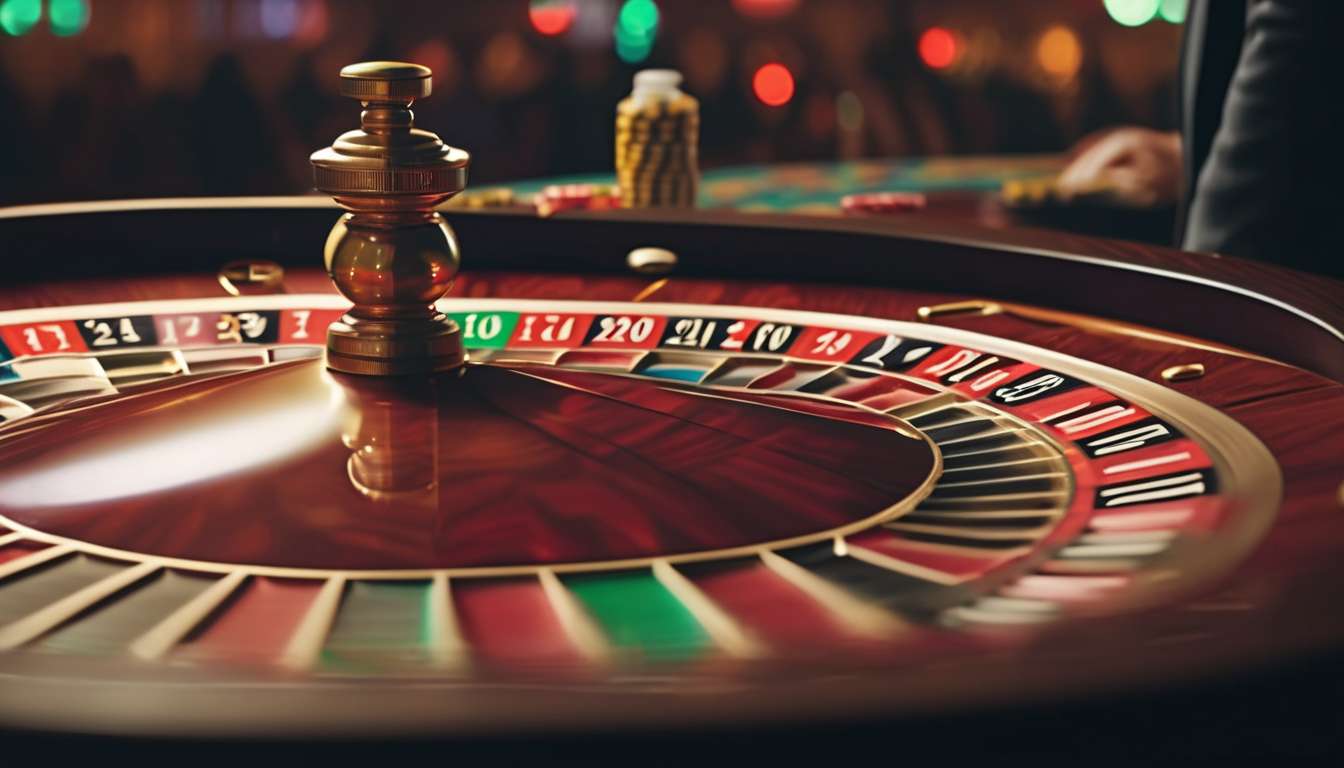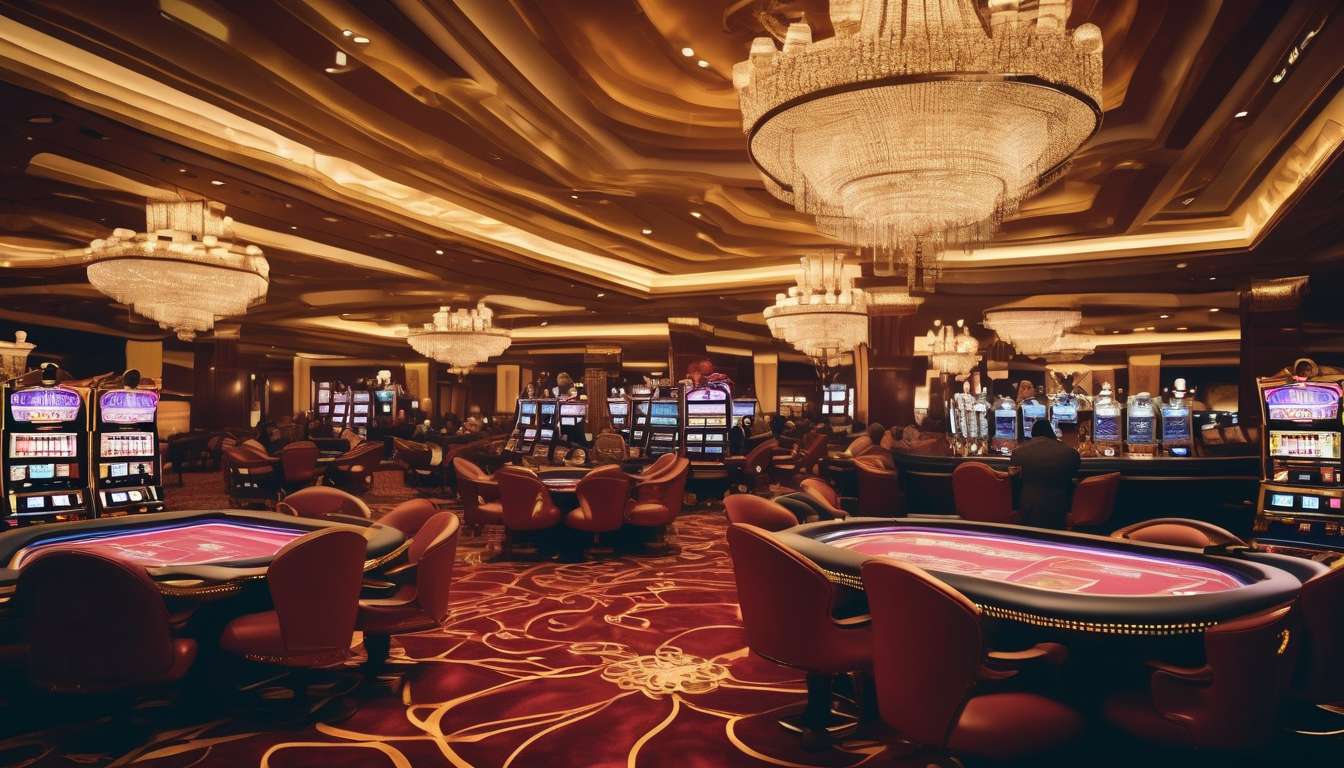As we step into the vibrant and bustling world of casinos, a swirl of excitement and curiosity envelops us. We find ourselves captivated not just by the dazzling lights and the melodic clinking of chips, but by the enigmatic allure of the games themselves.
Have we ever paused to wonder how these games, which seem to offer endless possibilities, are meticulously crafted to balance chance and strategy? Together, we embark on a journey to unravel the mysteries behind casino game odds.
Our exploration will delve into the intricate calculations that govern each spin of the roulette wheel, each shuffle of the deck, and every roll of the dice. By understanding the mathematical underpinnings of these games, we:
-
Enhance our appreciation of the art and science involved.
-
Equip ourselves with the knowledge to navigate the casino floor more strategically and confidently.
Through this journey, we aim to not only enjoy the thrill of the games but also gain insights into the careful design that ensures both chance and strategy play their roles in the world of casinos.
The Fundamentals of Probability
Probability forms the backbone of casino game odds, helping us understand the likelihood of various outcomes. It’s like the secret language we all share, connecting us as we navigate the uncertainty of each game. By grasping probability, we’re better equipped to recognize patterns in games and anticipate results. The thrill of the unknown keeps us coming back, but it’s probability that provides a sense of order amidst the chaos.
Casinos use probability to maintain their edge through the concept of the house edge. This ensures that, over time, the casino makes a profit. It’s a reminder that while luck plays a role, the odds are calculated to favor the house.
Random Number Generators (RNGs) are the unsung heroes of casino games, ensuring that each outcome is fair and unpredictable. They work tirelessly behind the scenes, making sure we all have a fair shot, even as probability whispers its secrets to us.
In summary, understanding probability helps players:
- Recognize patterns in games
- Anticipate results
And allows casinos to:
- Ensure a long-term profit through the house edge
- Provide fair and unpredictable game outcomes using RNGs
The Role of House Edge
In every casino game, the house edge is the mathematical advantage that ensures the casino profits over the long run. Understanding the house edge helps us play smarter and feel like part of the winning crowd.
The House Edge Explained:
- The house edge is the percentage that represents the difference between the true odds and the payout odds.
- This percentage secures the casino a reliable profit margin.
When we grasp this concept, we see how probability plays a pivotal role in determining outcomes. By using probability, casinos calculate the house edge to maintain their advantage.
Factors Influencing the House Edge:
- Game Rules: In games like blackjack, the edge is influenced by specific rules and player choices.
- Random Number Generators (RNGs):
- RNGs ensure unpredictability, creating fair yet challenging scenarios.
- They are integral to games like slots, where each spin is independent and random.
Knowing about the house edge and probability allows us to better appreciate the casino’s design, making our gaming experience more informed and enjoyable.
Deciphering Random Number Generators
In our quest to understand casino games, we must delve into the mechanics of how random number generators (RNGs) create unpredictability and fairness. RNGs are the heart of digital games, crafting sequences that mimic randomness. By generating numbers that dictate outcomes, these algorithms ensure each game round is unique.
They harness probability to maintain fairness, yet subtly uphold the house edge. This edge is crucial for casinos, ensuring they profit while keeping games exciting for us.
We all crave fairness when playing, and knowing that RNGs are unbiased helps us feel part of a fair gaming community. These generators don’t favor any player; they simply follow mathematical principles. Even as they ensure the house edge remains, RNGs give each of us an equal shot at winning (or losing).
Understanding this balance between probability and the house edge allows us to appreciate the intricacies of casino games, making us more informed and engaged players.
Understanding Return to Player (RTP)
When we talk about casino games, understanding the concept of Return to Player (RTP) is essential for grasping how much we might expect to win back over time. RTP is a percentage that represents the average amount of wagered money a game will return to players.
- If a game has an RTP of 95%, it means, on average, we can expect to get back $95 for every $100 wagered.
Probability also plays a crucial role. Each game’s outcome is influenced by Random Number Generators (RNGs), ensuring fairness and unpredictability.
The house edge complements RTP and represents the casino’s advantage over players.
- If a game has an RTP of 95%, the house edge is 5%, meaning the casino keeps that portion over the long run.
By understanding RTP, we join a community of informed players, making smarter choices. It’s not just about luck; it’s about knowing how the system works and maximizing our chances.
Impact of Game Rules on Odds
Game Rules and Their Impact on Odds
Game rules significantly shape the odds, determining how often we might win or lose in any given session. When we step into a casino, understanding these rules can help us feel part of an informed community.
Probability and Game Types
Probability dictates the likelihood of specific outcomes, and every game has its unique set of rules that influence this. For instance:
- Blackjack allows us to make strategic decisions that can affect the probability of winning.
- Roulette relies purely on chance, with no opportunity for strategic decision-making.
House Edge
House Edge is another crucial factor; it’s the advantage the casino holds over us. Different games have varying house edges, impacting our potential returns.
Random Number Generators (RNGs)
Random Number Generators (RNGs) further add to the complexity by ensuring outcomes are unpredictable. We might feel the thrill of chance, but behind the scenes, RNGs are hard at work.
Informed Decision-Making
By grasping these elements:
- Game rules
- Probability
- House edge
- RNGs
We’re better equipped to make choices that align with our gaming goals, fostering a sense of belonging within the gaming community.
The Mathematics Behind Slot Machines
Slot machines, with their mesmerizing lights and sounds, operate on intricate mathematical principles that determine our chances of winning. As we gather around these enticing games, we’re all part of a shared experience influenced by probability and the house edge.
The heart of a slot machine is its Random Number Generator (RNG), a computer program that ensures each spin’s outcome is random and independent. This randomness means that our odds of winning are based on probability, not predetermined patterns.
The house edge is a small percentage advantage that casinos hold over us, built into the machine’s design. While it ensures the casino’s long-term profitability, it doesn’t prevent us from enjoying the thrill of a possible win.
Despite knowing that the probability of hitting a jackpot is slim, the allure of slot machines keeps us coming back. Together, we embrace the uncertainty, knowing the mathematics behind these games connects us in our shared quest for fortune.
Strategies for Table Games
When it comes to table games, a well-thought-out strategy can significantly enhance our chances of coming out ahead. By understanding the probability of each move, we can make informed decisions that align with our goals.
As a community of players, we share the desire to beat the odds and reduce the house edge as much as possible. Knowing these odds helps us feel connected and empowered when we sit at the table.
Most table games, unlike slots, don’t rely on random number generators. Instead, they depend on our skills and strategies.
For example, in blackjack:
- If we count cards or follow basic strategy, we can slightly tip the probability in our favor.
In games like roulette:
- Choosing bets with lower house edges, such as even-money bets, can increase our potential winnings over time.
By coming together and sharing strategies, we increase our collective knowledge and foster a sense of belonging in our pursuit of success.
Impact of Variance on Payouts
Understanding variance is essential as it directly influences the fluctuations in our payouts during casino games. When we dive into a game, variance dictates how often we win or lose, impacting our gaming experience. It’s like the heartbeat of the game, creating those exhilarating highs and challenging lows.
Probability and the house edge play pivotal roles here. They set the stage for possible outcomes, allowing us to calculate potential winnings and losses.
Random Number Generators (RNGs) are crucial in maintaining fairness and unpredictability, ensuring each spin or card draw is truly random. This randomness, coupled with variance, can make a game either a thrilling ride with big wins or a steady play with smaller payouts.
It’s the variance that adds spice to our gaming experience, making every session unique and engaging. By understanding these elements, we can better navigate our strategies, manage expectations, and enhance our sense of belonging within the gaming community.
How do casinos ensure fairness in games with complex odds?
We ensure that games with complex odds are fair by implementing several key measures:
-
Certified Random Number Generators: These are used to guarantee that every player has an equal chance of winning.
-
Regular Audits: By conducting regular audits, we maintain the integrity and fairness of our games.
Transparency and integrity are crucial to maintaining trust among our players. This commitment to fairness is what sets us apart and keeps our customers coming back for an exciting and trustworthy gaming experience.
Are there any regulatory standards that dictate how odds should be calculated for casino games?
Regulatory Standards for Casino Odds
Yes, there are regulatory standards that dictate how odds should be calculated for casino games. These standards are essential for ensuring transparency and fairness in the gambling industry.
Purpose of Standards:
- Provide guidelines for accurately determining the probabilities of different outcomes in games.
- Maintain trust between players and casinos.
- Uphold the integrity of the gaming experience for all involved.
Importance of Adherence:
Adhering to these regulations is crucial, as it helps:
- Ensure that games are fair and outcomes are not manipulated.
- Protect players from fraudulent practices.
- Foster a trustworthy and reliable gaming environment.
By following these guidelines, casinos can offer an experience that is both enjoyable and trustworthy, reinforcing players’ confidence in the fairness of the games.
How do casinos update their odds calculations in response to player behavior trends?
We monitor player behavior trends closely to update our odds calculations.
By analyzing how our guests interact with games, we can make adjustments to ensure an engaging experience. This process allows us to stay responsive to what players enjoy and tailor our offerings accordingly.
Our goal is to create an enjoyable environment where everyone feels welcome and valued.
Conclusion
In conclusion, you now grasp the intricate process of calculating casino game odds.
By understanding:
- Probability fundamentals
- The role of house edge
- The impact of game rules
you can make informed decisions while playing.
Remember, random number generators and return to player percentages play a crucial role in determining your chances of winning.
So next time you hit the casino floor, use this knowledge to your advantage and enhance your gaming experience.
Happy playing!




